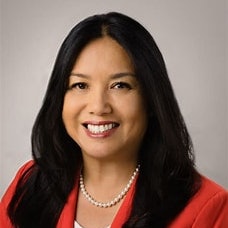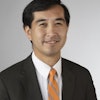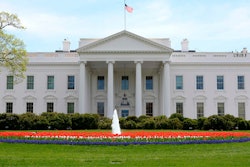Dr. Rowena Tomaneng was part of the tiny 1.5% of Asian American Pacific Islander college presidents nationally when Berkeley City College hired her to  Dr. Rowena Tomaneng
Dr. Rowena Tomaneng
But ironically, it also dropped her from the sliver of college CEOs of AAPI and Desi ancestry.
As Wyman Fong, a longtime advocate for multiplying the number of AAPI and Desi senior leaders, puts it: “This is like a zero-sum game.”
Indeed, the dearth of AAPI and Desi college presidents is nothing new. Every time someone of this racial demographic becomes a president, observers say, it seems to coincide with someone else’s departure. Promotions like Tomaneng’s, coupled with retirements, have fueled an intractable scarcity of AAPI and Desi presidents.
Only 3.6% of U.S. college presidents are AAPI or Desi, according to the 2022 American College President Study, the most recent year for which statistics are available. Desi people are those with ancestral ties to India, Pakistan, or Bangladesh. The survey encompasses community colleges along with four-year institutions. This 3.6% is so paltry that a 2023 report by the American Council on Education stated, “We are unable to highlight unique and varied experiences of AAPI-Desi” presidents.
“We have not really advanced as much as those of other (nonwhite) affinity,” says Tomaneng. “Our numbers are small compared to others such as African Americans and Hispanics.”
In the 2022 study, African Americans made up 13.2% of higher education chief executives, while Hispanics were 5.7%.
Historically, the percentage of AAPI presidents has languished at around 1.5%, no matter when this study occurred. That was the figure in 2011, for instance, and it was not significantly different in 2006 – nor 25 years before the latter. The study is conducted every five years or so. In 2022, Desi showed up as a race/ethnicity survey category for the first time.
Fong, who organized conference sessions for the annual Asian Pacific Americans in Higher Education (APAHE) conference for more than a decade, says he used to initiate workshops and panel discussions as often as possible featuring incumbent presidents in order to convey to attendees that presidencies are attainable career goals. During interviews with Diverse over the years, AAPI presidents and others have attributed the scarcity in part to the so-called bamboo ceiling phenomenon – a misconception that AAPI people lack the assertiveness for leadership roles.
“We’re seen as workhorses rather than show horses,” says Fong, who retired last December as Vice Chancellor for Human Resources for the Chabot-Las Positas Community College District in northern California. “It’s a matter of not just educating our own community but also reversing the perceptions about us.”
Tomaneng had not pictured herself as a college president. But having been recruited into other leadership roles, such as Associate Vice President for Instruction at De Anza College south of San Francisco, she says she felt “more than ready” when applying for these top jobs. As deputy chancellor of California Community Colleges, she fosters policies and practice that support student success and college effectiveness.
As APAHE board president, Tomaneng is considering forming a national network for AAPI and Desi provosts and senior administrators to provide them executive coaching as reminders that presidencies – not their current roles – can be career mountaintops.
Meanwhile, an India-born provost has been named the sole finalist for the University of Texas at Dallas presidency. Dr. Prabhas Moghe has been executive vice president of academic affairs at Rutgers University since 2020. A professor of biomedical engineering and chemical and biochemical engineering, Moghe was vice chancellor for research and innovation at Rutgers-New Brunswick for two years before taking the No.2 post at Rutgers flagship campus.
At its annual conference this spring, APAHE gave its Community Champion award posthumously to Dr. Bob Suzuki, who died last year. An engineer by training, Suzuki, along with his parents, had been confined to an incarceration camp for Japanese Americans during World War Two. He worked as a Boeing research engineer in the 1960s, at times participating in civil rights and equity efforts. The latter moved him to switch gears and become a full-time academician to address pressing social problems. In the 1970s, he taught in multicultural education and Asian American studies, even publishing pathbreaking papers to debunk the Model Minority myth that historically insists that people of Asian descent are all wealthy high achievers.
Suzuki was the first Asian American to lead a major U.S. university – California State Polytechnic University, Pomona. During 12 years there ending in 2003, Suzuki constantly urged mid- and senior-level AAPI administrators of Asian descent to pursue the top jobs. He continued to do so, one person at a time, deep into retirement and was interviewed by Diverse about it. He had become so concerned while leading the Pomona campus that according to APAHE leaders, Suzuki, along with then-University of California, Berkeley President Chang-Lin Tien, convened a mid-1990s gathering of AAPI college administrators to ask, “What are you all going to do” about the meager number of presidents who looked like them.
As part of their answer, one initiative is scheduled to begin this summer, Tomaneng and others say. Leadership Education for Asian Pacifics (LEAP), a national nonprofit founded in the 1980s, has secured a three-year grant totaling $400,000 from the Mellon Foundation to boost the number of educators in the humanities participating in leadership development training. Suzuki had been instrumental in laying the foundation for LEAP’s programming, now called LEAP Advance.
Under the grant, higher education professionals will participate in four days of culturally relevant, intensive training at – perhaps fittingly – Cal Poly Pomona, where Suzuki had been president. Organizers say 12 people had registered by late April out of a maximum 35 slots. These dozen registrants have trajectories that Tomaneng says are somewhat similar to her own early career: teaching English and women’s studies, then Acting Dean in a couple of areas at De Anza College before rising to Associate Vice President for Instruction there.
According to Mellon, educators trained in the following disciplines will likely qualify for the summer institute: anthropology, archaeology, art history, classics, ethnic studies, film studies, gender studies, history, language studies, literature, musicology, performance studies, philosophy, political theory and religious studies.
For his part, Fong, who in retirement is an APAHE emeritus board member, laments that the Mellon Foundation grant can’t squeeze more than 35 participants during each of the three summers.
But as Tomaneng views it, building some capacity beats none. “We’re very aware of the need to increase the pipeline” into college presidencies.


















